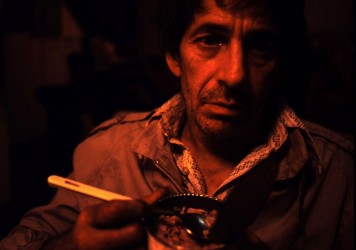Gael García Bernal takes down a dictator with glossy TV advertising in this brilliant Chilean satire.
Set in 1988 and based upon real events, No is the third and final instalment of Chilean director Pablo Larraín’s trilogy exploring the effects of the Pinochet dictatorship and it follows the darkly comic one-two punch of Tony Manero and Post Mortem.
This time, Larraín casts his eye over the changing role of the media in his country’s politics. Gael García Bernal stars as Rene Saavreda, a slick, persuasive ad-man enlisted by a coalition of anti-Pinochet parties to spearhead a ‘No’ campaign (a series of 15-minute political TV commercials) which aim to depose the dictator. Eventually figuring that a cowed public are unlikely to find inspiration in the grim, torture’n’tear-gas montages cooked up by the team, Saavreda resolves to infuse the campaign with the same relentlessly upbeat sheen he brings to cheesy ads for clients like Free Cola.
Not everyone is on board with his radical approach (“It’s shit!” cries an old-schooler, before storming out of a meeting), but after some initial misfires, the slyly cynical campaign of positivity soon proves dramatically popular with the Chilean populace. It also provokes a fearsomely calculated response from the ‘Yes’ team, who count among their number Saavreda’s ingratiating boss, played by fantastically sinister Larraín regular, Alfredo Castro.
With a probing, insistent style redolent of classic political thrillers like Costa-Gavras’ Z, Larraín handles the narrative with skill and economy, digging deep into the details of both campaigns while the personal stakes rise incrementally – it’s not long before the ‘No’ team come under pressure from Pinochet’s thugs. Amid the escalating drama, he also displays a genuine interest in his characters, with a focus on the growing tensions that develop in the ‘No’ camp and a number of tenderly observed moments between Saavreda and his young son.
There’s also an intriguing thread which tracks the ambiguous relationship between Saavreda and his estranged activist wife (Antonia Zegers); her passion and willingness to put her body on the line provide a stark counterpoint to Saavreda’s aloof and distanced campaign style.
As with Larraín’s previous two films, there’s also much humour to be found within the drama. With fond incisiveness, the director (who was 12 at the time of the referendum) mines the kitsch value of the era’s pop-culture detritus to great effect and there’s a fine running gag about the inexplicable appearance of mime artists in all the media Saavreda creates. No’s most striking – and potentially divisive – feature is its aesthetic.
Larraín has opted to shoot on videotape on a vintage 1983 U-matic camera – the standard format for most news programmes until roughly 1990. With its globby, over-saturated reds and lingering streaks of light, it’s not always easy on the eye, but it’s a bold choice which fosters a bracing stylistic unity and works as a direct challenge to perceived notions of authenticity in period reconstruction.
Like it or loath it, you’d be hard pressed not to see it as a staggering technical achievement, as it’s almost impossible to tell where the extensive archive footage (including use of the real adverts) ends and the newly shot material begins. In an amusing way, it’s as though Larraín is taking a leaf out of Saavreda’s book in trying to sell us the past with visual trickery; luckily, it works like a dream.
The film’s look also has a drastic effect on Bernal, who is as magnetic as the videotape on which the film is shot. With his soulful stares and cut-glass cheekbones, he’s still devilishly handsome, but deglamourised by the brusque, muddy lines on the videotape. The son of a political dissident, Saavreda is a tantalising, unreadable character and it’s a pleasure to watch him gradually develop across the course of the film, even if we’re never quite sure what’s going on behind those big brown eyes. His growing political consciousness, too, is ambiguously observed and far from a Damascene conversion.
As No reaches its stirring finale, there’s a hollowed-out look to Saavreda; it’s as if he’s measuring the spiritual cost of his crucial involvement in a paradigm shift which has helped to remove a feared dictator, but paved the way for a new political climate of cynical cultural manipulation, venal advertising and bland celebrity endorsement.
Published 7 Feb 2013
Pablo Larraín is one of the most exciting directors around.
Gripping, intelligent and complex socio-historical excavation.
A resounding yes.

Ace Chilean director Pablo Larraín delivers a brooding and provocative drama about disgraced priests.

Master doc maker Patricio Guzmán returns with a stunning look at our destructive relationship with Earth.

By Anton Bitel
Pablo Larraín’s Saturday Night Fever-inspired drama is a damning indictment of the Pinochet dictatorship.